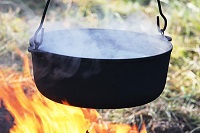 Survival cooking is a lot different from everyday cooking. When the power is out or you have to abandon your home, you’ll no longer be able to throw food into the microwave or oven. You’ll have to use a grill, a camping stove, or maybe even an old-fashioned campfire. But if you don’t have a lot of experience cooking without power, you’re going to run into problems. These 5 survival cooking tips will make cooking easier while preserving resources and maintaining your health.
Survival cooking is a lot different from everyday cooking. When the power is out or you have to abandon your home, you’ll no longer be able to throw food into the microwave or oven. You’ll have to use a grill, a camping stove, or maybe even an old-fashioned campfire. But if you don’t have a lot of experience cooking without power, you’re going to run into problems. These 5 survival cooking tips will make cooking easier while preserving resources and maintaining your health.
- While cooking, keep the lids on pots and pans. This will make your food cook faster and stay moist. You can lower the heat and still cook effectively which will preserve your cooking fuel. Crockpots are built on this idea.
- Use potatoes to get rid of excess sodium. Most canned foods have extremely high levels of sodium. Consuming this much sodium everyday will raise your blood pressure which is hard on your overall health (especially during a stressful survival situation). To get rid of some of the excess sodium, add slices of potatoes to your food while cooking then remove then when finished. The potato will draw out in the salt and make your meal a tad healthier.
- Always cook with olive oil. If you are frying something on the stove or cooking vegetables, use olive oil. It’s good for your heart and makes cleanup easier. Food will typically absorb much of the oil, and the leftover oil will be very minimal and safe to clean in the sink without risk of clogging pipes. Dish soap usually cuts right through olive oil. Also, some olive oils have a shelf life of up to 2 years.
- Cook eggs in salt water. There are three reasons for this. First, the eggs will cook faster because salt increases the boiling point of water, so the egg will end up being in hotter water. Second, the salt in the water can tell you if the eggs are fresh or not. If the egg floats, it is fresh. Third, eggs are easier to peel when cooked in salt water because the membrane will coagulate better and separate from the shell with ease.
- Clean pots and pans while they’re still hot. If you do this, it will be a lot easier to clean the food off of your pots and pans. Food particles will come off easier than when allowed to cool and then dry to the cookware. If you allow one pot to stay on the burner and boil some water, you can use that water to clean your other pots and pans.
Hopefully these tips will make life slightly easier after the SHTF. We’ll be sharing more cooking tips soon.
Source:http://urbansurvivalsite.com
